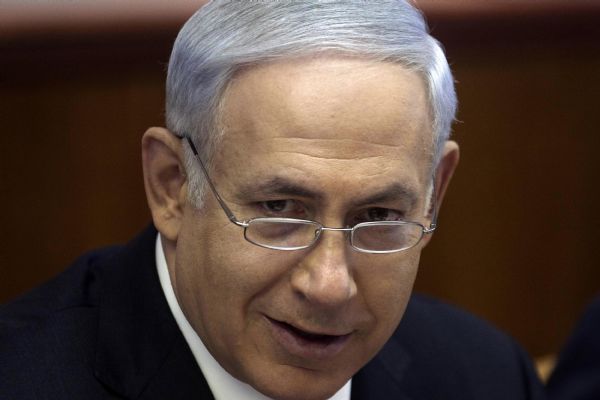Netanyahu facing pressure as Israelis take to streets
 0 Comment(s)
0 Comment(s) Print
Print E-mail
Xinhua, August 1, 2011
E-mail
Xinhua, August 1, 2011
On Saturday evening a conservatively-estimated 80,000 Israelis took part in nationwide protests against spiraling costs of living. The largest protest was held in Tel Aviv, where some 50,000 demonstrators joined tent camps that have popped up across the city in protest over the high cost housing in the country's business center.
 |
|
Israel's Prime Minister Benjamin Netanyahu attends the weekly cabinet meeting in Jerusalem July 31, 2011. Israel's government pushed back against escalating cost-of-living protests on Sunday, saying some reforms being demanded would invite economic crises like those besetting parts of Europe and the United States. [Xinhua/Reuters] |
Similar demonstrations were also held in Haifa, Beersheba, Ashdod and several other cities and towns.
While the housing situation was the focus on Saturday, it is only one of several issues that have gotten masses of Israelis into broiling summer streets lately. Two months ago a consumer boycott of cottage cheese and dairy products led producers to lower their prices, and last week parents marched through Tel Aviv to protest what they said was high prices for private daycare.
Meanwhile, doctors and medical interns at Israeli hospital are in the midst of a major strike, and are calling for higher salaries and better working conditions.
Local analysts said that the social protests may prove to be the toughest challenge for Prime Minister Benjamin Netanyahu since winning the election in 2009. However, they believe that Netanyahu would remain in power even there would be changes in the set up of the government.
Internal criticism
Netanyahu has - not surprisingly - been criticized for his handling of the crisis by opposition leader Tzipi Livni of the Kadima party. Nevertheless this time the prime minister is also facing criticism from within his own Likud ranks.
Local media have reported that some Likud ministers had urged Netanyahu to fire Finance Minister Yuval Steinitz, although both of them have denied that the housing crisis caused a rift between them.
Prof. Galia Golan of the Inter-Disciplinary Center in Herzliya told Xinhua that despite the denial there is a possibility that Netanyahu would replace Steinitz, especially after the director-general of the Finance Ministry, Haim Shani, resigned on Sunday citing fundamental difference of opinion with Steinitz.
"This is a very difficult situation for Netanyahu, because this really is a broad public protest and it includes people from his own party," Golan said.






Go to Forum >>0 Comment(s)